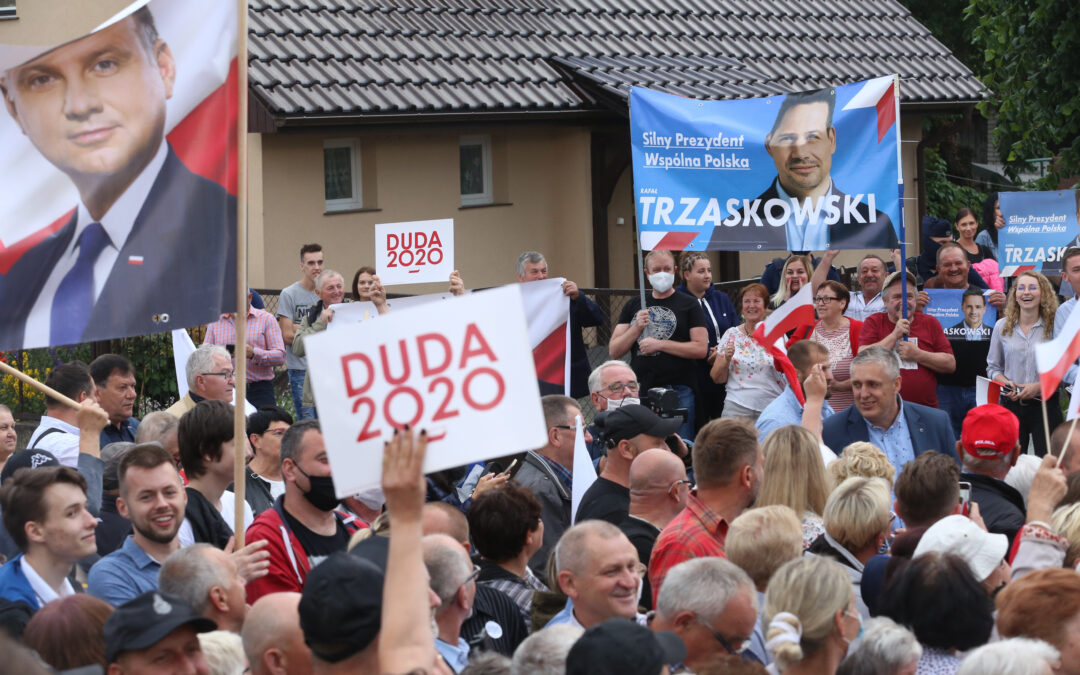By Aleks Szczerbiak
Poland’s presidential election run-off is on a knife-edge. The right-wing incumbent won the first round convincingly and remains narrow favourite as no second-placed challenger has ever come from so far behind to win. But his liberal opponent has much greater potential to win over supporters of the defeated first-round candidates.
A plebiscite on the ruling party
Poland’s July 12th presidential election run-off is of crucial importance and will determine the shape of the political scene until the next parliamentary poll, scheduled for autumn 2023. A victory for incumbent Andrzej Duda – who is supported by the right-wing Law and Justice (PiS) grouping, the ruling party since autumn 2015 – would give the government a three-year run without any national elections to continue implementing its radical state reconstruction programme.
However, the ruling party lacks the three-fifths legislative majority required to overturn a presidential veto, so a victory for Duda’s challenger – Warsaw mayor Rafał Trzaskowski, who is backed by the liberal-centrist Civic Platform (PO), Poland’s governing party between 2007 and 2015 and currently the main opposition grouping – would be a disaster for PiS, seriously hampering its ability to govern effectively and possibly precipitating an early parliamentary election.
The election was originally scheduled for 10 May, with a second round run-off a fortnight later if no candidate secured more than 50% of the votes. Given his relatively high approval ratings, and the fact that he was Poland’s most trusted politician, Duda was widely assumed to be the favourite. He made great efforts to build up a strong base of support in the often-forgotten parts of small-town, provincial Poland that constitute PiS’s electoral heartland, which provided him with enormous political capital going into the campaign.
Duda’s core appeal was as the guarantor of PiS’s programme of extremely popular social spending and welfare policies for families and low income households, who felt frustrated that they had not shared sufficiently in Poland’s post-communist transformation, while simultaneously maintaining strong economic growth and reducing the state budget deficit.
Duda’s biggest weakness was his vulnerability to the accusation that he was a partisan president who lacked any political independence and simply acted as the government’s “notary”. In many ways this was not surprising as Duda broadly agreed with much of PiS’s critique of the alleged dysfunctionality of the post-communist state and its core institutions; his disagreements were generally over how radical reforms should be and the best means of achieving them. But Duda did not really make any serious attempt to carve out a role for himself as an independent political actor able to transcend the government-opposition divide.
Last autumn’s parliamentary election – when PiS retained its overall majority but lost control of the Senate, Poland’s less powerful second chamber – showed how evenly balanced support for the government and opposition was, with many voters determined to use any opportunity to block the ruling party. Although polls suggested that Duda would easily win the first round of voting with around 40-45% of the vote, the second-round run-off was always expected to be extremely closely fought and unpredictable.
The opposition’s strategy was to turn the presidential election into a plebiscite on the government by tying Duda as closely as they could to the ruling party. The danger for Duda was that a key group of voters who were positively inclined towards him personally but did not necessarily support PiS would use the election to express their hostility towards the government.
Changing election dynamics
In March, the coronavirus pandemic crisis changed the dynamics of the presidential campaign, and initially PiS benefited from the so-called “rally effect”: the inevitable psychological tendency for worried citizens to unite around their political leaders and state institutions as the embodiment of national unity at times of a sudden and dramatic external threat. This strengthened Duda, and polls started to show that he could win a clear victory in the first round.
In the end, the May election never took place, because legislation proposed by PiS that would have introduced universal postal voting to allay public safety concerns was not approved in time due to a split within the governing camp. Subsequently, the Polish parliament agreed a new electoral law that allowed Poles to either vote traditionally in polling stations (which would have to adhere to sanitary standards) or cast postal ballots (which very few chose to), and the first round was rescheduled for 28 June.
The fact that Duda’s electoral strategy was premised on there being a May poll meant that when the election was postponed he needed to reinvigorate his campaign. Moreover, as the “rally effect” waned, the election dynamics once again changed, with the economic slowdown arising from the pandemic putting pressure on the state budget and making it difficult for Duda to offer any substantial new social spending and welfare pledges.
This forced him to recalibrate his campaign message to claim that PiS was the party best placed to oversee recovery while protecting families and low-income households. Duda also argued that only his re-election offered governing stability at a time of ongoing epidemiological and economic crisis, saying that the opposition would simply use the presidency to undermine the government and sabotage its policies.
The election delay also allowed PO to replace its struggling presidential candidate Małgorzata Kidawa-Blońska, who proved completely unsuited to a national crisis situation and saw her poll ratings slump to single figures. Trzaskowski is a much more formidable campaigner, and made an energetic start, quickly regaining the mantle of main opposition challenger and putting Duda on the back foot. Although much of his initial polling surge came from core PO voters who were planning to abstain or vote for another opposition candidate returning to the fold, it gave his campaign a sense of momentum.
However, Trzaskowski’s credibility among well-educated metropolitan voters, which helped him to quickly re-build PO’s support, also gave PiS an opportunity to portray him as embodying the urban liberal elites that looked down upon culturally conservative small-town provincial Poland.
For example, as part of an effort to both consolidate and mobilise PiS’s core traditionalist electorate and highlight the fact that Trzaskowski was distinctly more liberal on moral-cultural issues than the average Pole, Duda introduced a “family charter” that included pledges to not allow same-sex couples to marry or adopt children and ban propagation of what PiS termed “LGBT ideology” in schools and public institutions.
Last year, in one of his first high-profile policy initiatives as mayor, Trzaskowski signed a declaration which included a proposal to introduce a comprehensive, LGBT-approved sex and anti-discrimination education programme intended to teach children about all aspects of sexuality and sexual behaviour in the city’s schools starting at an early age.
Nonetheless, Trzaskowski worked hard to shake off claims that he was an economic and cultural liberal extremist. He bent over backwards to reassure Poles that he would not reverse PiS popular social spending and welfare policies, while sidestepping moral-cultural issues, speaking instead in general terms about equality and tolerance. Trzaskowski also tried to counter PiS’s accusations that he would sabotage the government by arguing that the president needed to be more independent of the governing party and provide it with constructive opposition.
Wooing the defeated candidates’ supporters
In the event, Duda emerged as the clear first-round winner, securing 43.5% of the vote, with Trzaskowski on 30.5%. Duda’s support was roughly the same as PiS’s 2019 vote share, but at the higher end of the party’s expectations; some polls had suggested that he could fall below 40%. Trzaskowski scored better than PO did in 2019, but was hoping to break through the 30% barrier more decisively and reduce Duda’s lead to single figures. To win the run-off, Trzaskowski will have to increase his vote share by 20 percentage points, something no previous Polish presidential challenger has managed to achieve.
Given the scale of this challenge, as well as mobilising even more of this core supporters (difficult, as the 64.5% turnout was already extremely high by Polish standards), Trzaskowski will need to win support among those Poles who voted for other candidates in the first round. In particular, he will have to attract the supporters of the independent TV presenter and liberal-centrist Catholic journalist Szymon Hołownia.
By precipitating a shift from traditional campaigning to political communication through the internet and social media, the pandemic crisis played to Hołownia’s strengths as a skilled direct-to-camera performer. Although Trzaskowski’s entry into the race limited Hołownia’s scope for picking up disillusioned PO voters, he was still able to make an attractive pitch to the many Poles who craved a “new” non-party candidate, and finished a strong third with 13.9%. For sure, Hołownia’s success was, in large part, a vote against PO. By portraying himself as an insurgent candidate of change, Trzaskowski, whose unofficial campaign slogan was “we have had enough!” (“mamy dość!”), is hoping that he will win over most of Hołownia’s supporters.
However, Hołownia’s endorsement of the PO candidate was heavily qualified, because he also wants to use his presidential election success as a springboard to create a new political movement, “Poland 2050” (Polska 2050). Moreover, it is not clear to what extent Hołownia’s vote represented a more general rejection of the PiS-PO duopoly.
The Ipsos agency’s exit poll found that 31% of abstainers in the 2019 election supported Hołownia, comprising 15% of his total electorate. If many of these end up considering Trzaskowski to be as much a part of the political establishment as Duda then they may simply stay at home. PiS is, therefore, trying to associate Trzaskowski as much as possible with the previous PO governments, in which he held a number of ministerial posts but has, up until now, managed to distance himself from.
Duda, on the other hand, has better prospects of picking up support among those who voted for Krzysztof Bosak, the candidate of the radical right Confederation (Konfederacja) grouping, who finished fourth, securing 6.8%. For sure, Duda’s defeat would serve Confederation’s narrow partisan interests, because its long-term political project is to challenge PiS on its right flank.
Moreover, Bosak’s voters hold radical free-market views on economic issues, and Trzaskowski has attempted to woo them by promising to veto any government tax increases (although he also pledged to maintain PiS’s costly social welfare policies). However, Duda’s traditionalist-conservative views on moral-cultural issues and promoting Polish national identity and traditions are much more likely to appeal to Bosak’s supporters than Trzaskowski’s cosmopolitan social liberalism.
On a knife-edge
Poland’s presidential election is too close to call, with polls showing the two main candidates running neck-and-neck. A larger-than-expected first round victory makes Duda the narrow favourite, but he will need to continue to mobilise and energise his voters in smaller towns and rural areas, where turnout is traditionally lower.
Although no presidential challenger has ever come from so far behind to win a second round run-off, the government’s opponents in the opposition’s urban heartlands are highly motivated, and Trzaskowski appears to have much greater potential to pick up new voters among supporters of the defeated candidates.
The key to the election could well be moderate conservatives in provincial towns who are wary about concentrating too much power in the hands of PiS, but like Duda personally and need to be convinced that Trzaskowski can offer a vision of the presidency that goes beyond simply opposing the government.
Main image credit: Cezary Aszkiełowicz/Agencja Gazeta





















